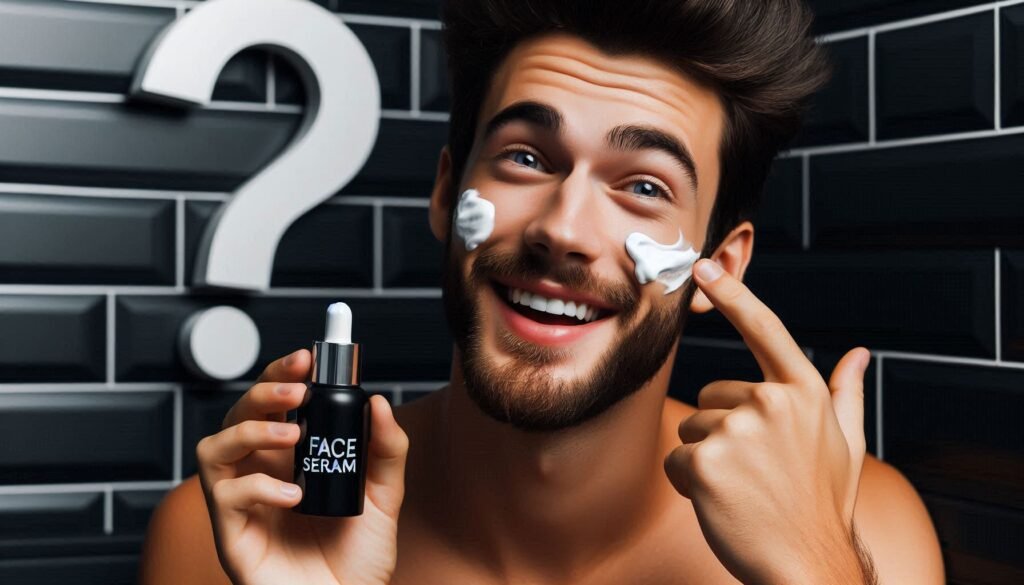
Table Of Contents:
(Click And Go Directly)
Choosing the right face serum can be a game-changer in your skincare routine. Whether your skin is oily, dry, combination, or sensitive, the right serum can help you achieve a healthier and more radiant complexion. But with so many options available, how do you know which one is best for your skin type?
This guide will walk you through the essentials of choosing the perfect face serum for your skin type, ensuring you get the best results from your skincare routine.
1. What Is A Face Serum?
A face serum is a concentrated skincare product designed to deliver active ingredients deep into the skin. Unlike moisturizers, which primarily hydrate the skin’s surface, serums penetrate deeper to address specific concerns such as fine lines, dryness, acne, or pigmentation.
Serums come in various formulations tailored to different skin needs, so understanding what your skin needs will help you choose the right one.
2. Why Your Skin Needs A Right Serum

Face serums are essential for targeting specific skin issues that a basic moisturizer may not address. Here’s why incorporating a serum into your skincare routine can be beneficial:
- Targeted Treatment: Serums are designed to address specific skin concerns like wrinkles, dullness, or acne.
- High Concentration: They contain a higher concentration of active ingredients compared to other skincare products.
- Deeper Penetration: Their lightweight formulation allows serums to penetrate deeper into the skin, delivering nutrients where they’re needed most.
3. How To Choose A Face Serum Based On Your Skin Type
1. For Dry Skin
If you have dry skin, look for a serum that provides intense hydration and helps restore the skin’s moisture barrier. Key ingredients to look for include:
Key Ingredients:
- Hyaluronic Acid: Attracts moisture to the skin.
- Glycerin: Helps retain moisture and keep skin smooth.
- Ceramides: Strengthens the skin’s natural barrier to prevent moisture loss.
| Ingredient | What It Does |
|---|---|
| Hyaluronic Acid | Attracts and holds moisture for deep hydration. |
| Glycerin | Draws water into the skin, maintaining hydration. |
| Ceramides | Restores and protects the skin’s moisture barrier. |
2. For Oily Skin
Oily skin requires a serum that balances oil production without clogging pores. Look for serums with:
Key Ingredients:
- Niacinamide: Helps regulate oil production and reduces pore size.
- Salicylic Acid: Exfoliates and prevents acne by keeping pores clear.
- Hyaluronic Acid: Hydrates without adding excess oil.
| Ingredient | What It Does |
|---|---|
| Niacinamide | Controls oil production and minimizes pores. |
| Salicylic Acid | Clears pores and reduces acne breakouts. |
| Hyaluronic Acid | Provides hydration without contributing to oiliness. |
3. For Combination Skin
Combination skin requires a balance of hydration and oil control. A good serum should address both dry and oily areas:
Key Ingredients:
- Hyaluronic Acid: Hydrates dry areas.
- Niacinamide: Regulates oil production in oily areas.
- Aloe Vera: Soothes and balances the skin.
| Ingredient | What It Does |
|---|---|
| Hyaluronic Acid | Provides hydration where needed without excess oil. |
| Niacinamide | Balances oil production and improves skin texture. |
| Aloe Vera | Soothes and hydrates without greasiness. |
4. For Sensitive Skin
Sensitive skin requires gentle care to avoid irritation. Look for serums with calming and soothing ingredients:
Key Ingredients:
- Aloe Vera: Soothes and reduces redness.
- Chamomile Extract: Calms inflammation and irritation.
- Niacinamide: Strengthens the skin barrier and reduces sensitivity.
| Ingredient | What It Does |
|---|---|
| Aloe Vera | Calms and hydrates sensitive skin. |
| Chamomile Extract | Reduces inflammation and soothes irritated skin. |
| Niacinamide | Enhances skin barrier function and reduces sensitivity. |
5. For Mature Skin
Mature skin benefits from serums that support collagen production and target signs of aging:
Key Ingredients:
- Retinol: Stimulates collagen production and reduces wrinkles.
- Vitamin C: Brightens the skin and evens out skin tone.
- Peptides: Help improve skin elasticity and firmness.
| Ingredient | What It Does |
|---|---|
| Retinol | Reduces wrinkles and promotes collagen production. |
| Vitamin C | Brightens and protects against environmental damage. |
| Peptides | Enhances skin firmness and elasticity. |
4. What To Avoid In Serums For Skin

When selecting a face serum, it’s important to know which ingredients to avoid to keep your skin healthy and free from irritation. Here are some things to watch out for in serums:
A. High Alcohol Content: Serums with high levels of alcohol can be overly drying and irritating, especially for sensitive or dry skin. Alcohol can strip the skin of its natural oils, leading to dryness and potential irritation.
B. Harsh Exfoliants: Avoid serums with strong exfoliating agents like high concentrations of glycolic acid or salicylic acid if you have sensitive or mature skin. These can cause excessive dryness, irritation, or redness.
C. Synthetic Fragrances: Fragrances, especially synthetic ones, can cause irritation and allergic reactions in sensitive skin. Opt for fragrance-free serums to minimize the risk of irritation.
D. Parabens and Sulfates: Parabens and sulfates can potentially disrupt the skin’s natural balance and cause adverse reactions. Choose serums that are free from these preservatives and surfactants to avoid potential skin issues.
E. Potentially Irritating Ingredients: Be cautious of serums with ingredients that may cause sensitivity, such as high concentrations of retinoids or certain botanical extracts. Always patch-test new serums and introduce them gradually to ensure they don’t irritate your skin.
5. How To Apply A Face Serum

To get the most out of your face serum, follow these steps:
Step 1: Cleanse Your Skin
Start with a clean face. Use a gentle cleanser suited to your skin type to remove impurities.
Step 2: Apply The Serum
Apply a few drops of serum to your face and neck. Gently pat the serum into your skin, focusing on areas of concern.
Step 3: Follow With Moisturizer
To lock in the benefits of your serum, apply a suitable moisturizer after the serum has been absorbed.
Step 4: Use Sunscreen
In the morning, finish with a broad-spectrum sunscreen to protect your skin from UV damage.
6. How To Layer A Face Serum
Using a face serum correctly is key to getting the best results. Serums should be applied after cleansing and toning but before moisturizing. This ensures that the serum’s potent ingredients are absorbed deeply into the skin, allowing them to work effectively. Follow this general order:
- Cleanser
- Toner
- Serum
- Moisturizer
- Sunscreen (if during the day)
Allow each layer to absorb fully before moving to the next for maximum effectiveness.
7. Top 5 Face Serums For Various Skin Types

Here’s a list of recommended serums for various skin types:
1. For Dry Skin: CeraVe Hydrating Hyaluronic Acid Serum
Contains hyaluronic acid and ceramides for deep hydration.
2. For Oily Skin: La Roche-Posay Effaclar Serum
Formulated with salicylic acid and niacinamide to control oil and prevent acne.
3. For Combination Skin: Kiehl’s Hydro-Plumping Re-Texturizing Serum
Balances hydration and oil control with hyaluronic acid and glycerin.
4. For Sensitive Skin: First Aid Beauty Ultra Repair Hydrating Serum
Features soothing ingredients like aloe vera and chamomile extract.
5. For Mature Skin: Olay Regenerist Retinol 24-Night Serum
Contains retinol and peptides to reduce wrinkles and improve skin texture.
8. Benefits Of Using A Face Serum
Face serums are a powerful addition to any skincare routine, offering targeted solutions to common skin concerns. Here are some key benefits you can expect from using a face serum:
- Targeted Treatment: Face serums are formulated to address specific skin concerns such as fine lines, hyperpigmentation, or acne. Their high concentration of active ingredients ensures that they effectively target and treat these issues more precisely than general moisturizers.
- High Concentration of Active Ingredients: Serums contain a higher concentration of active ingredients compared to other skincare products. This means they deliver potent benefits, such as hydration, anti-aging effects, or brightening, directly to the skin.
- Enhanced Absorption: The lightweight, fast-absorbing texture of serums allows them to penetrate deeper into the skin. This deeper penetration helps the active ingredients reach the underlying layers where they can have a more significant impact.
- Improved Skin Texture and Tone: Regular use of a face serum can help improve overall skin texture and tone. Ingredients like vitamin C and retinol can brighten the complexion, reduce uneven skin tone, and smooth out rough patches.
- Boosted Hydration: Many serums are designed to provide intense hydration. Ingredients like hyaluronic acid attract and retain moisture in the skin, which helps maintain a plump, hydrated, and youthful appearance.
9. How Often Should You Use A Serum
For most skin types, using a serum twice daily—once in the morning and once at night—can provide optimal results. If you have sensitive skin, start with once a day to see how your skin reacts.
Conclusion
Choosing the right face serum for your skin can make a significant difference in how your skin looks and feels. With the right ingredients tailored to your specific skin needs, a serum can hydrate, smooth, and brighten your complexion, all while addressing individual concerns like fine lines, acne, or dullness.
Remember to pay attention to your skin type, avoid harsh ingredients, and opt for products with quality, proven active ingredients. By making face serums a regular part of your skincare routine, you can enjoy healthier, more radiant skin that truly glows.
FAQs
So You have gotten all the answers about how to choose a face serum right for your skin, or how to choose a face serum right for your skin for men, or how to choose a face serum right for your skin that suits your face…
Like This Also Read- How To Choose A Face Serum For Glowing Skin: A Complete Guide









